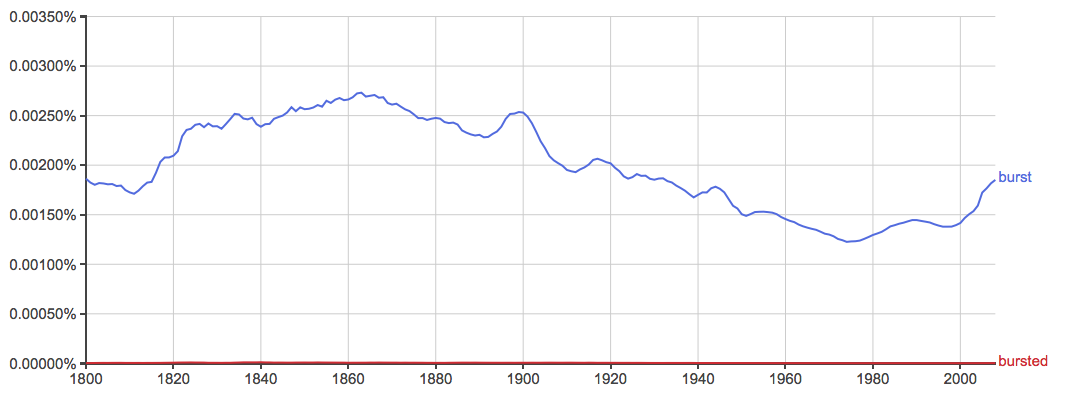Conjugation enables language users to modify verbs for actions that have already happened, are currently happening, or will happen in the future. Advanced conjugation techniques address actions that would happen under certain conditions, that had not yet happened in the past, but have since happened, or that have been continuously happening all along, whether we were paying attention or not.
If all these tenses weren’t confusing enough, many verbs don’t follow the regular rules of conjugation and are thus intuitively referred to as irregular verbs.
One such irregular verb is burst—though it would be tempting to use bursted in the past tense, like with most verbs, burst is conjugated differently.
What is the past tense of burst? Read on to learn about this confusing verb.
What is the Difference Between Burst and Bursted?
In this article, I will compare burst vs. bursted. I will outline the correct past tense of burst and use it in example sentences.
I will also show you a helpful memory tool that you can use to help you remember whether to use bursted or burst in your own writing.
When to Use Burst
 What does burst mean? Burst is a verb that means to pop or explode. The word burst forms many tenses of this verb in the past, present, and future.
What does burst mean? Burst is a verb that means to pop or explode. The word burst forms many tenses of this verb in the past, present, and future.
Here are a few examples,
- Olivia used her bubble wand to fill the backyard with bubbles, which burst when they hit the pine trees.
- The dot com bubble had already burst by the time Evelyn was old enough to buy a cell phone.
- The infection caused Kendra to break out in painful sores, which burst when scratched.
- Barbara was kind enough to burst my bubble every time I asked if Toyota was looking in our area. –Mississippi Business Journal
The verb burst is inflected as follows,
- Burst > Burst > Burst
As you can see, burst is the same in all of its inflections.
- I burst your bubble.
- He burst my bubble.
- They burst my bubble
When to Use Bursted
 What does bursted mean? Although bursted is not a word in English, some writers erroneously use it as a past tense or past participle for burst.
What does bursted mean? Although bursted is not a word in English, some writers erroneously use it as a past tense or past participle for burst.
As mentioned above, burst is itself the past tense form of this verb, making bursted unnecessary and incorrect.
As you can see from this chart, to say burst is the preferred conjugation is an understatement. Bursted barely registers a blip on the graph, and Bryan Garner in his book Garner’s Modern English Usage estimates that the difference is 689:1.

It should be noted that this chart is not scientific is not exhaustively accurate, but it is accurate enough to show that bursted is not a standard form of this verb.
Trick to Remember the Difference
Remembering bursted vs. burst is easy.
- You should not use bursted. It is an error.
- Instead, use burst anywhere you would be tempted to use bursted.
Since bursted contains an E that is not found in burst, you can remember that it is an error.
Summary
Is it burst or bursted? Burst is a verb that means to pop or explode. The word burst is used when conjugating this verb into past, present, and future tenses.
- Burst is the correct past tense of this verb.
- Bursted is never used; it is an incorrect conjugation.
You can think of the E in bursted as standing for error.
Remember, you can always check this site any time you need help with confusing words or other writing topics.
Contents
